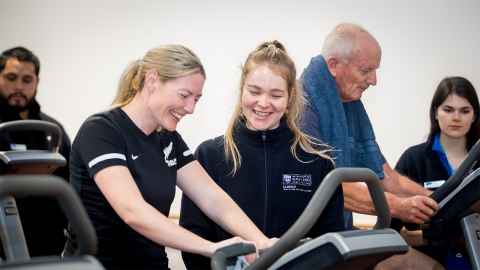Postgraduate study in Clinical Exercise Physiology

What can you study in Clinical Exercise Physiology?
The Master of Clinical Exercise Physiology (MClinExPhys) combines theoretical and practical clinical courses to prepare you for entry into the clinical exercise physiology industry.
Postgraduate study in Clinical Exercise Physiology develops a strong core of theory-based coursework alongside practical skills in the assessment and critical analysis of exercise and physical activity data. This informs effective exercise prescription. You will complete at least 600 hours of hands-on, immersive work-integrated learning during your degree. You will have the opportunity to develop skills in:
- Conducting clinical and exercise-related assessments for people living with chronic conditions
- Evaluating elements of an exercise prescription to maximise outcomes to health
- Independently supervising and monitoring evidence-based exercise interventions
- Communicating with clients, whānau, peers and staff and other members of a clinical team
- Applying professional behaviour according to cultural, ethical and clinic standards expected by Te Tiriti o Waitangi and the Clinical Exercise Physiology profession in New Zealand
Graduates of the MClinExPhys are eligible to take the certification exam to become a registered clinical exercise physiologist with the American College of Sport Medicine. Find out more information about this international accreditation from the Commission on Accreditation of Allied Health Educations Programs (CAAHEP) and the ACSM websites.
Structuring your postgraduate programme in Clinical Exercise Physiology
Please note: Applicants interested in the Master of Clinical Exercise Physiology (MClinExPhys) must apply for a Semester One start no later than the 1 November. Due to the accreditation of the degree and its specific course requirements, credit transfers are not possible.
Master of Clinical Exercise Physiology (MClinExPhys) 180-point taught masters
60 points from:
- EXERSCI 719 Seminar in Exercise Physiology
- EXERSCI 720 Clinical Exercise Physiology I
- EXERSCI 776 Clinical Exercise Physiology Practicum I
90 points from:
- EXERSCI 721
- EXERSCI 724 Seminar in Advanced Clinical Exercise Physiology
- EXERSCI 777 Clinical Exercise Physiology Practicum II
- EXERSCI 778 A/B Clinical Exercise Physiology Practicum III
30 Points from:
- EXERSCI722 Critical Evaluation of Research in Rehabilitation
- EXERSCI 723 Research in Rehabilitation
- EXERSCI 781 A/B Research Project
Where can postgraduate study in Clinical Exercise Physiology take you?
Clinical Exercise Physiologists work in hospitals, clinics, or fitness centres, with sporting organisations, or in private practice.
Jobs related to Clinical Exercise Physiology include:
- Clinical exercise physiologist
- Exercise rehabilitation adviser
- Injury prevention consultant
- Occupational health advisor
- Safety consultant
Key programme accreditation outcome measures
Our performance on key program accreditation outcome measures required by the Commission on Accreditation of Allied Health Education Programs (CAAHEP)
Graduation Rate
The number of successful PGDip CEP and MSc CEP graduates by year.
| Reporting Year | Number of Graduates |
Graduation Rate |
|---|---|---|
| 2017-2018 |
32 | 100% |
| 2018-2019 |
26 |
92% |
| 2019-2020 |
17 | 100% |
| 2020-2021 |
14 |
88% |
| 2021-2022 |
20 |
95% |
| 2022-2023 | 18 | 95% |
Graduate Satisfaction Rate
The percentage of enrolled students completing the CAAHEP graduate satisfaction survey over the past 5-years, along with the percentage of all positive satisfaction returned. Positive satisfaction with the program is defined as having an average score of 3 or better out of 5 for all questions on the survey. Our program average each year is greater than 4 out of 5.
| Reporting Year | Number of Satisfactory Surveys | Surveys Obtained |
Satisfaction Rate |
|---|---|---|---|
| 2017-2018 |
17 | 17 | 100% |
| 2018-2019 |
11 | 11 | 100% |
| 2019-2020 |
10 | 10 | 100% |
| 2020-2021 |
5 | 5 | 100% |
| 2021-2022 |
9 | 9 | 100% |
| 2022-2023 | 12 | 12 | 100% |
| 2023-2024 | 24 | 24 | 100% |
Positive Graduate Employment 1-year post-graduation
Note: Note: Positively Employed means having attained employment as a clinical exercise physiologist or in a similar allied health-related field, or as continuing in education at a higher qualification. Prior to 2022, only students graduating with an MSc in Clinical Exercise Physiology are included in the calculation.
| Reporting Year | Positively Placed | Number of Graduates | Percentage Positively Placed |
|---|---|---|---|
| 2017-2018 |
14 | 17 | 82% |
| 2018-2019 |
10 | 12 | 83% |
| 2019-2020 |
7 | 10 | 70% |
| 2020-2021 |
3 | 3 | 100% |
| 2021-2022 |
8 | 10 | 80% |
| 2022-2023 | 20 | 20 | 100% |
| 2023-2024 | 17 | 18 | 94% |
NOTE: Between 2017 and 2022 represents MSc CEP graduate data only.
Scholarships and awards
Each year, we award scholarships and prizes to thousands of students.
Find out about the scholarships you may be eligible for, search available scholarships or begin an application by visiting Scholarships and awards.
Help and advice
Student Hubs
Visit a Student Hub for help and advice on any aspect of your studies and life at University.
The Student Hubs are your physical gateway to Waipapa Taumata Rau, University of Auckland.
The Student Hubs services are available seven days a week at the City, Grafton and Tai Tonga campuses and six days a week at Tai Tokerau, with friendly staff available to provide you with advice on any aspect of your studies and life at the University.